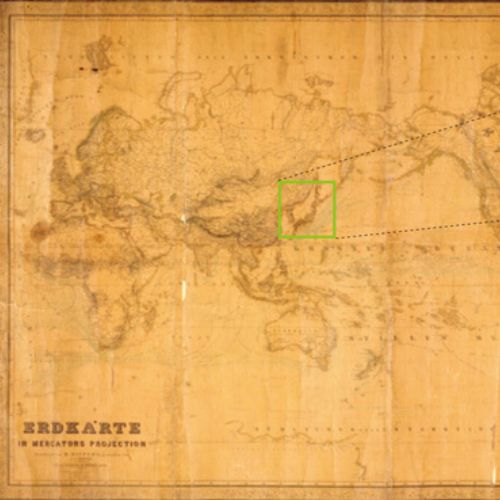Striving to preserve India’s ancient and traditional skills of handcrafted spinning and weaving, Fumie Kobayashi is working with local artisans to share its magic with the world
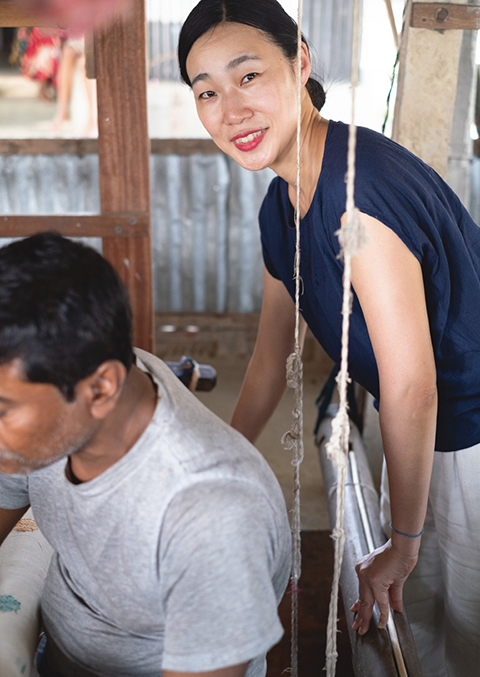
Fumie Kobayashi together with an artisan who is using a handloom to make traditional weaves.
The history of handspun, handloom cotton in India goes back very far. It is said that people have been making such cloth in the Indus Valley Civilization since around 2000 BC. Fumie Kobayashi, president of CALICO LLC, is fascinated by the texture and beauty of Indian traditional handspun, handloom cotton. While working in the Delhi office of a consulting company, she started dreaming of “further spreading the skills and promoting an appreciation of Indian handspun, handloom cotton to Japan and the rest of the world.” Believing that she could improve its designs to contribute to its popularization, she founded her company in 2012. She named her company CALICO after the generic name of Indian fabrics that were extremely popular in Europe in the 17th and 18th centuries, and which even made their way to Japan.
Today, the textile industry is one of India’s major industries, employing around 35 million people. The handloom industry, which is part of it, accounts for 95 percent of the entire world’s handloom production, with an estimated 4.3 million or so handloom weavers in India. Surrounding a single artisan weaver are many men and women cooperating in various jobs, such as spinning yarn, preparing warps and wefts and dyeing, washing and selling the cloth. “India’s father of independence, Mahatma Gandhi once said ‘Khadi (handspun, handloom cotton) is the sun of the village solar system,’ and even in today’s 21st century, Indian textile remains an important industry that is deeply rooted in and inseparable from village life,” says Kobayashi.
Kobayashi’s company CALICO collaborates with Indian artisan weavers to plan, design and produce traditional handspun fabrics such as khadi and jamdani weave, and kantha embroidery, and then sells it to Japan and other countries around the world. Believing in building a relationship of trust with the local workers, Kobayashi says, “We always respect the artisans. We give them full autonomy and never impose overly rigid quality control or delivery ultimatums as exists in Japanese style factory production.”
The history of Indian cloth in Japan can be traced back many centuries. In the 17th century, Indian cloth was very popular in the city of Edo, which is now Tokyo, and it greatly influenced Japanese attire and culture. However, the majority of Japanese and Indians are unaware of that fact. “I would like to work with India’s artisans to create cloth that is handed down to the next generation as art and culture, and make Japanese people appreciate it’s value,” says Kobayashi, who wishes to instill pride in the people of local Indian villages and help make sustainable industries out of the handicraft for them. With this wish in mind, she has been employing various ideas. For example, designs of hand-printed sarasa cloth, which are treated as works of art, are reproduced with a contemporary flair using traditional Ajrakh techniques from the Kutch region in the District of Gujarat. Her company CALICO also sells tote bags decorated with fine embroidery and appliqué originally used for wedding ceremony attire by the Rabari people, who live on the border between India and Pakistan.
Kobayashi also says she “wants Japan to see the cultural and historical sides of Indian handspun, handloom cotton” by inviting Indian artisans to Japanese department stores, collaborating with art museums and galleries, and actively promoting the virtues of Indian handicraft. Striving to show the entire world the charm of India’s valuable traditional culture, Kobayashi is continuing to work with local artisans to create Indian cloth.
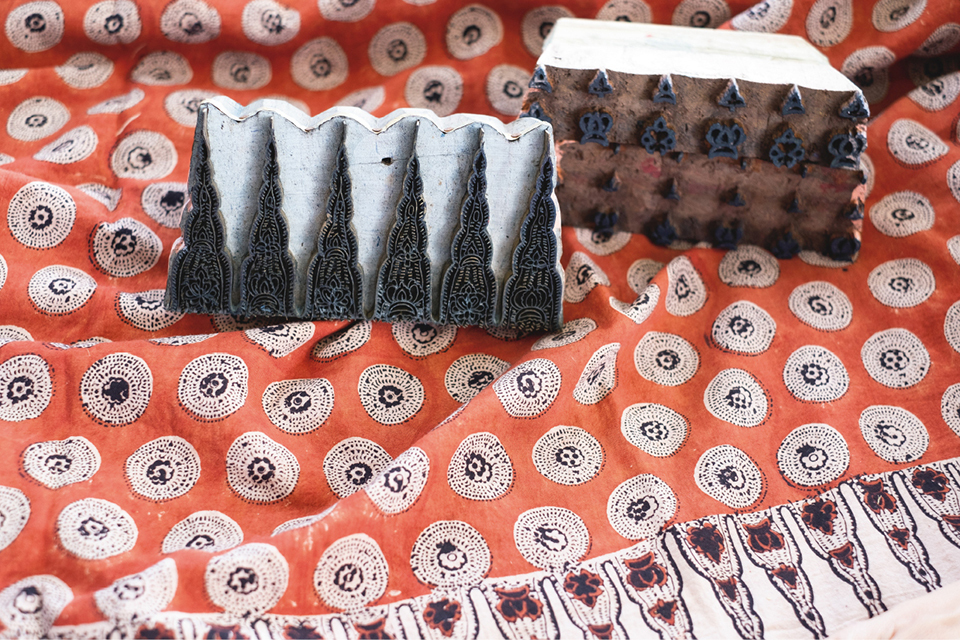
CALICO has made its own original brass printing plate and uses Ajrakh block-print techniques to replicate the patterns of hand-printed sarasa cloth with a contemporary flair.
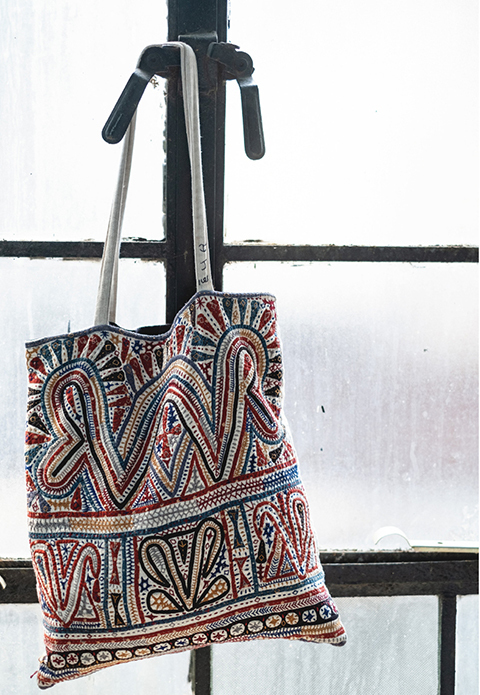
A beautiful embroidered and appliqué Rabari tote bag. Rabari women apply appliqué using leftover Ajrakh-printed cloth.
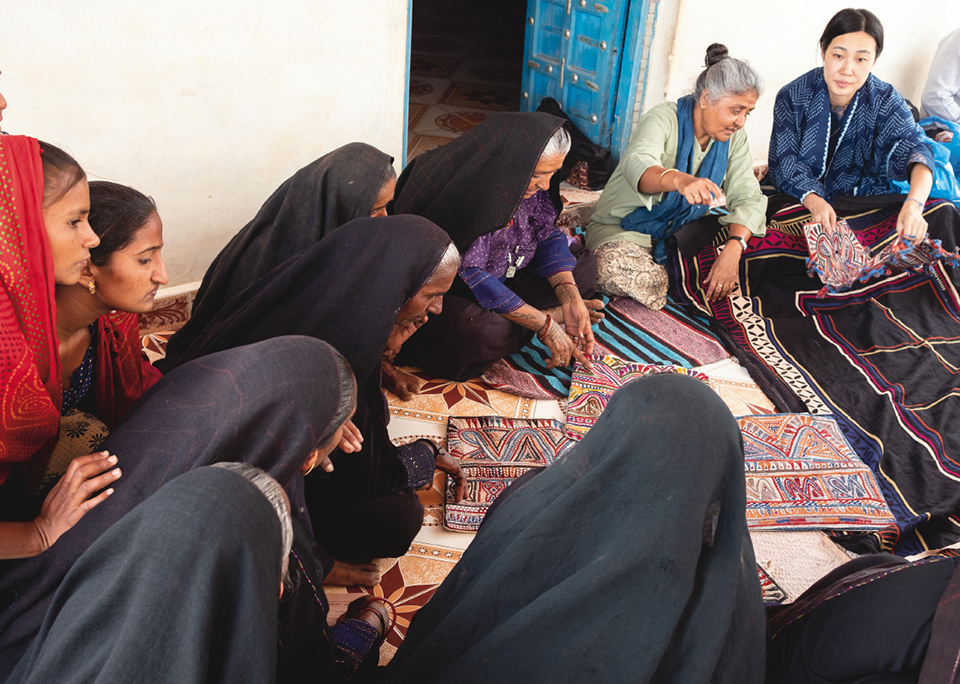
Kobayashi sits together with members of Qasab (Qasab-Kutch Craftswomen’ Producer Co. Ltd.), which received the Nari Shakti Puraskar 2018 (Women Power Award), an award that the president of India gives to women who have contributed to society. She views a new embroidered product made by Rabari women and talks about the reaction by Japanese consumers to the products.
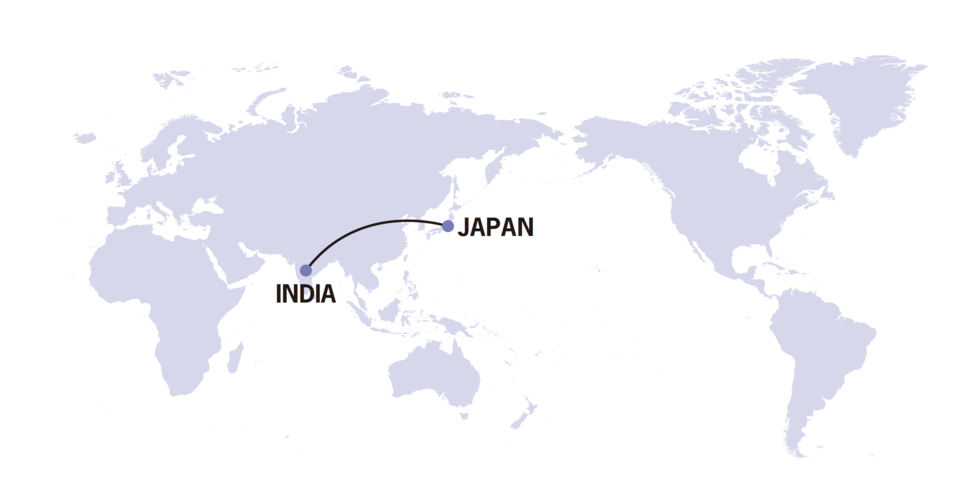
Fumie Kobayashi
Born in Osaka Prefecture in 1973, Kobayashi developed an interest in cloth as a child through the influence of her grandparents, who worked in textiles. After graduating from Sophia University in Tokyo, she started her career in media and later switched to consulting. Now she is president of CALICO LLC, which serves as a sales agency for Indian handspun, handloom cotton and its products.



























